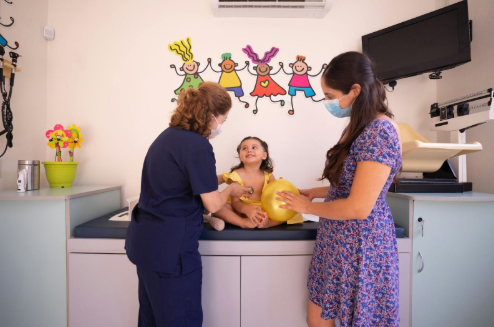The Importance of Well-Child Exams for Your Child’s Health and Development
The Importance of Well-Child Exams for Your Child’s Health and Development

A child’s health is the foundation for their future well-being. Regular well-child exams play a crucial role in monitoring growth, identifying potential health issues, and ensuring children receive the preventive care they need. These visits provide an opportunity for parents to discuss their child’s development with a healthcare provider and establish healthy habits from an early age. At Silver Pine Medical Group, we emphasize the importance of well-child exams as a key component of pediatric care.
What Are Well-Child Exams?
Well-child exams are routine checkups designed to assess a child’s physical, emotional, and developmental health. These visits typically start soon after birth and continue through adolescence. Unlike sick visits, which focus on treating illness, well-child exams focus on prevention and overall wellness.
During a well-child visit, healthcare providers assess multiple aspects of a child’s health, including growth and development milestones, immunizations and preventive screenings, vision and hearing assessments, nutrition and physical activity recommendations, and behavioral and mental health evaluations. Each visit is an opportunity to detect any potential health concerns early and ensure children are reaching age-appropriate developmental milestones.
The Recommended Schedule for Well-Child Visits
The American Academy of Pediatrics (AAP) provides a recommended schedule for well-child exams to ensure consistent monitoring of a child’s health. These visits typically occur at the following intervals:
- Newborn (within the first week of birth)
- 1 month
- 2 months
- 4 months
- 6 months
- 9 months
- 12 months
- 15 months
- 18 months
- 2 years
- 2.5 years
- 3 years and annually thereafter through adolescence
Following this schedule ensures that children receive timely immunizations, screenings, and medical evaluations necessary for their overall health.
Key Benefits of Well-Child Exams
Routine visits have benefits like:
Preventive Care and Immunizations
Vaccinations protect children from serious diseases, including measles, polio, and whooping cough. Additionally, providers conduct screenings for conditions such as anemia, lead exposure, and hearing or vision issues, which, if left undetected, could impact a child’s long-term health. These preventive measures protect individual children and contribute to community-wide public health by reducing the spread of infectious diseases.
Vaccinations also play a crucial role in strengthening a child’s immune system during their most vulnerable years. By introducing a weakened or inactive form of a virus or bacteria, vaccines train the immune system to recognize and combat these threats effectively, often before a child is ever exposed to the actual disease. Staying up to date with the recommended immunization schedule ensures children are protected at the appropriate ages, especially during key developmental stages.
Tracking Growth and Development
Regular checkups allow healthcare professionals to track a child’s height, weight, and developmental milestones. By comparing a child’s progress with standard growth charts, providers can identify potential concerns early. If delays in speech, motor skills, or cognitive development are detected, early intervention strategies can be implemented. Well-child visits offer an opportunity to discuss age-appropriate physical activities that support healthy growth and motor skill development.
Early Detection of Health Issues
Many chronic conditions, such as asthma, allergies, and diabetes, can develop in childhood. Well-child exams help detect these conditions in their early stages, allowing for timely treatment and management. Early diagnosis improves outcomes and minimizes complications in the future. Providers may also assess environmental factors, such as exposure to allergens or secondhand smoke, that could impact a child’s health and recommend appropriate interventions.
Behavioral and Mental Health Support
A kid's mental fitness is similarly as crucial as their bodily fitness. Well-child visits include screenings for behavioral and mental health concerns such as anxiety, depression, ADHD, and developmental disorders like autism. Identifying these challenges early allows families to seek appropriate support and interventions. Providers can also offer guidance on managing screen time, social interactions, and coping strategies for emotional regulation to help children develop strong mental resilience.
Parental Guidance and Education
Well-child exams provide parents with a valuable opportunity to discuss concerns about their child’s health, nutrition, sleep habits, and overall well-being. Pediatricians and family physicians offer expert advice on managing common childhood issues, from feeding difficulties in infants to screen time recommendations for older children. In addition, these visits allow for discussions on home safety, such as childproofing, water safety, and recognizing signs of illness that require medical attention.
How Parents Can Prepare for a Well-Child Visit
To make the most of a well-child visit, parents should come prepared with questions and concerns. Here are a few tips to ensure a productive appointment:
Bring Medical Records
Parents should keep track of their child’s immunization history and any past medical treatments. Having accurate medical records ensures that healthcare providers have a complete picture of the child’s health and can make informed decisions regarding their care.
Make a List of Concerns
Before the visit, parents should note any concerns regarding their child’s health, including sleep patterns, nutrition, or behavior. Discussing these concerns with the provider during the appointment helps address any worries and allows for better guidance.
Observe Developmental Milestones
It is helpful for parents to monitor their child’s motor skills, speech development, and social interactions. By paying close attention to these areas, they can provide valuable insights to the healthcare provider and ensure their child is meeting age-appropriate milestones.
Encourage Your Child’s Involvement
For older children, involving them in the conversation during the visit can be beneficial. Encouraging them to ask questions about their health fosters independence and helps them develop a positive attitude toward medical care.
Why Choose Silver Pine Medical Group for Well-Child Care?
At Silver Pine Medical Group, we are committed to providing comprehensive and compassionate pediatric care. Our team of experienced healthcare providers ensures that each well-child visit is thorough, informative, and tailored to meet the unique needs of every child. We prioritize preventive care, early detection, and family-centered guidance to promote long-term health and well-being.
Regular well-child exams are essential for protecting a child’s health and ensuring their proper development. By staying up to date with these visits, parents can take proactive steps to support their child’s growth and prevent potential health issues. If your child is due for a well-child exam,
schedule your appointment with
Silver Pine Medical Group today. Your child’s health and future depend on it.











